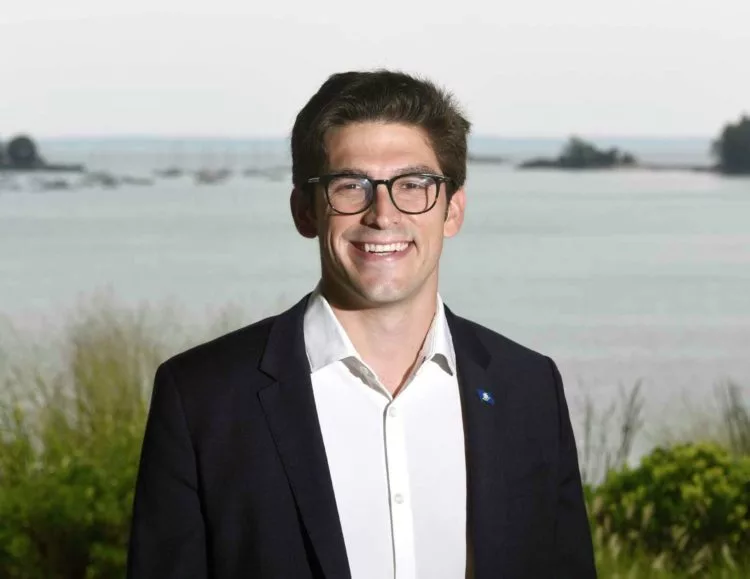
Answers from Ryan Fazio (R), Incumbent State Senator Running for Re-election, District 36
Basic Information
Full Name: Ryan Fazio
Office Sought: State Senator, 36th District
Contact Information:
Email: ryan@ryanfazio.com
General Questions
Top Three Priorities if Elected
Lower Taxes and Higher Economic Growth:
Connecticut is a great state, but has suffered under high taxes, high cost of living, and slow economic growth for years. That is the fault of state policy. We have the second highest taxes, third highest electricity rates, and rising costs across the board. We need to provide relief to good people who are struggling. I’ve been fighting for lower taxes, electric costs, and higher incomes, introducing comprehensive legislation that would cut income taxes by $2,000 per family, electric bills by $500 while eliminating “public benefits” taxes, and cap property taxes. We can and must stop the overspending and costly regulations and deliver fiscal responsibility and pro-economic growth policies for all.
Protect Local Control:
Defending local control over zoning is vital to protecting the unique character and appeal of our communities. I have consistently fought state overreach into local governance, most notably by helping to block harmful legislation such as HB 5390, which would have allowed developers to bypass local zoning and impose high-density developments in our towns. I also co-authored SB 333, restoring greater authority to municipalities over zoning decisions. Moving forward, I will continue to stand against state-imposed mandates and protect the autonomy of our local governments.
Reduce Electricity Bills and Cost of Living:
Connecticut’s energy costs are among the highest in the country, a reality that unfairly burdens working families, seniors, and small businesses. My six-point energy plan focuses on cutting the “Public Benefits” taxes from our electricity bills, capping state-subsidized electricity purchases, and ensuring stronger oversight of utility companies. I co-authored bipartisan laws, such as SB7, to strengthen utilities oversight to protect consumers, but we need to pass proposals to reduce costs for consumers. I have been one of the leading advocates in the state for cutting electricity rates and reducing “public benefits” taxes, and I will continue to be in the Senate.
Professional, Volunteer, or Public Service Experience
I’ve served our community in the state Senate, spent years volunteering for charitable causes, and have spent my career in business in the area. Over the past three years as your State Senator, I have built a record of bipartisan collaboration, co-authoring six common sense laws that address key issues facing our community. These laws include strengthening utilities oversight, expanding access to birth control, and restoring local control over zoning. Each piece of legislation has been carefully crafted to address real-world challenges, and each is making a tangible difference in the lives of the people I represent.
Before entering politics, I spent nine years working in commodities trading with a focus on renewable energy and agriculture. Since then I have worked at a small investment firm that invests in and helps operate small and medium sized business. My background in the private sector has provided me insight in how we can make our energy portfolio more affordable and also create an environment where small businesses can grow and we can great good jobs.
My volunteer experience has been equally important in shaping my approach to public service. For seven years, I served as a tutor in inner-city schools in the Bronx, working with middle school students from underserved neighborhoods. Additionally, from the beginning of the COVID-19 pandemic until earlier this year, I delivered meals for Meals on Wheels every week, connecting with seniors who were isolated and in need of assistance. This weekly service allowed me to build relationships with senior citizens that have become very important to me (and even got me a few birthday party invitations!).
Policy Questions
Local Control: How do you propose to protect your district’s control over zoning decisions? What is your approach to balancing affordable housing needs with preserving the town’s character?
Local control over zoning decisions is crucial to maintaining the character of our towns and ensuring that development happens in a way that benefits the community. I have consistently fought to protect local control. Because affordable housing is important, each community should offer it in their own way, utilizing creative solutions and being innovative in their approaches without Hartford wrecking their efforts. Greenwich, New Canaan, and Stamford are filled with remarkably creative problem solvers who know better how to govern their communities than big developers or Hartford politicians.
A Model of Local Autonomy in Zoning
In Greenwich, affordable housing programs are managed by Greenwich Communities, which focuses on balancing development with the town’s unique character. Programs like Connecticut’s “Time to Own” provide forgivable loans to help residents transition from renting to homeownership, enabling them to save for future down payments. However, Greenwich is already facing severe infrastructure and traffic challenges, and unregulated development without careful planning could exacerbate these issues. By keeping local control over zoning decisions, the town can ensure growth is sustainable, addressing housing needs without overwhelming its infrastructure.
• Community Involvement: Greenwich places a high value on community input. Public hearings are held for nearly all major development proposals, ensuring that residents have a voice in shaping their town.
• Zoning Regulations: Strict zoning laws limit the construction of high-rise or multi-unit developments in residential areas, preserving the character of the town. The Planning and Zoning Commission currently has the authority to approve or deny projects based on these regulations, and its decisions are generally aligned with residents’ preferences for maintaining open space and reducing congestion.
• Affordable Housing Approach: Greenwich addresses affordable housing needs primarily through the organization Greenwich Communities and through developments that blend into existing neighborhoods, like accessory dwelling units (ADUs) and townhouses. This method allows the town to meet affordable housing goals without significantly altering the town’s landscape or increasing traffic congestion.
Utilities: What steps have you taken/will you take to address rising costs of electricity, natural gas, and water?
Connecticut’s utility costs are unsustainably high already and they will continue to increase until more is done. I have made reducing them a top priority. My six-point energy plan, which has now gained 64 co-sponsors (more than any other energy proposal in the state), reduces inflated costs like “public benefits” charges, which funds half a billion dollars of government programs through the electric bill. Additionally, I’ve called for capping state subsidies for state-directed electric purchases, equal regulatory treatment for all types of clean energy, and a tough and independent utilities regulator. The plan will reduce our electricity rates for the long-run while protecting our power grid.
Please explain your stand on the current situation with Aquarion.
The proposed sale of Aquarion Water Company is actually very serious. I am grateful you asked the question because too few people know about this critical issue.
This sale has raised significant concerns for communities like New Canaan and Greenwich, and I share those concerns deeply. Aquarion is being targeted for acquisition by the South Central Connecticut Regional Water Authority (RWA). I’ve been working closely with local leaders, including New Canaan First Selectman Dionna Carlson and Greenwich First Selectman Fred Camillo, to address these issues, about which they are equally concerned.
What’s Happening
Earlier this year, Eversource announced plans to sell Aquarion. RWA, a quasi-governmental agency, has expressed interest in purchasing Aquarion. This potential sale has raised alarms on multiple fronts.
First, the biggest concern is regulatory oversight. As it stands, Aquarion is regulated by the Public Utilities Regulatory Authority (PURA), which ensures that rate increases are carefully reviewed and justified. However, RWA is not subject to PURA’s oversight. Without this level of oversight, towns like New Canaan and Greenwich could see increases in water rates of up to 50%, which is unacceptable.
There’s also the issue of municipal finances. Aquarion is a key taxpayer in towns like New Canaan, contributing over $300,000 in property taxes annually. If RWA acquires Aquarion, as a quasi-governmental agency, it wouldn’t pay property taxes. Instead, it would offer fixed Payments in Lieu of Taxes (PILOT). This could deprive our towns of much-needed revenue for essential services. Dionna Carlson and Fred Camillo have both expressed serious concerns about this.
My Stance on the Issue
RWA is currently preparing its formal bid for Aquarion, and I’m encouraging all residents to understand the issue and speak out. Together with Dionna Carlson and Fred Camillo, I am committed to ensuring that this process is fair to our towns and that our interests are considered and protected.
Economy: How will you address the economic challenges posed by inflation? What legislative measures will you support to ease the financial burden on households and businesses in your district?
We must reduce taxes, limit wasteful spending, reduce cost of living, and create an economy that benefits everyone. While the Democratic legislative leadership and my opponent have expressed a desire to lift the state’s spending cap, which will lead to higher taxes in the future, I am strongly in favor of limiting spending so we can cut taxes in the future. The state’s spending cap, passed in bipartisan fashion and co-authored by my predecessor Sen. Scott Frantz and supported by Gov. Ned Lamont, is the only reason we were able to slightly cut taxes last year. If we extend the spending cap, simplify the tax code, and limit debt issuance, we can cut taxes for the average family by $2,000 per year.
I also support a property tax reforms that limits yearly increases and protect homeowners from sudden, unaffordable hikes. To stimulate economic growth, I will also streamline regulations across the energy sector, health care sector, and labor sector to help us reduce cost of living and increase economic growth for all. We can create an economy that works in our state with the right policies and leadership.
Supermajority: What does having a supermajority in the Connecticut legislature mean to you and to your district?
A super-majority happens when both the house and senate have one party that controls two-thirds of the votes. A super-majority is “veto-proof” meaning that the governor of that state cannot over-ride legislation and that one party can exert a massive amount of control over its own members while ignoring the other party entirely. “Power corrupts. Absolute power corrupts absolutely,” Lord Acton said.
A supermajority in the Connecticut legislature poses a serious risk to the checks and balances that are essential to good governance. It allows one party to pass legislation without the need for compromise or debate, often leading to laws that are poorly written, not properly vetted, and hastily passed (like the ant-policing bill) that do not reflect the needs or values of our district. It also means that Governor Lamont would essentially be facing a veto-proof majority and his moderate hands would be tied. For towns like Greenwich, New Canaan, and Stamford, this could mean higher taxes, reduced local control, and the imposition of state mandates that disregard our unique needs. The 36th Senate seat that I now fill is one of the only seats left standing between a majority and a super-majority. I have worked hard to protect our communities from overreach, and I will continue to do so by advocating for balanced representation and moderation in the legislature. We have more bi-partisan efforts that lead to great legislation when we have more balanced representation.
Bipartisanship: How would you describe the current political environment in Connecticut? If elected, how will you contribute to improving the tone of political discourse and foster cooperation among different political viewpoints?
In an age of polarization in politics, we need to bring people together. In my time in the Senate, I have prioritized building bridges and finding common ground across party lines. That’s why I have passed six significant laws with bipartisan support, proving that collaboration is possible and desirable. If re-elected, I will continue to focus on common-sense solutions that unite rather than divide, fostering a political environment where dialogue and cooperation can lead to meaningful progress. My record shows that by working together, we can achieve results that benefits everyone in our district and state..
Your View: What should we have asked that we did not?
Read and vet the bills before they become law.
Passing laws in the State Senate is one of the most important responsibility we have, and it’s not something to be taken lightly. Crafting legislation requires careful thought, pragmatism, and a deep understanding of the real-world impact it will have on the people we represent. If a law is poorly written, or if it tries to do too much without fully considering the consequences, it can cause irreparable harm. In many cases, it’s better to vote against potentially flawed legislation, even if some aspects seem promising, because we can always revise and pass it later. But once a bad law is on the books, it becomes the reality that people have to live with every day, and undoing that damage is far more difficult.
Legislation should never be rushed in the name of ideology or short-term political gain. In our haste to push through a particular agenda, we run the risk of making mistakes that hurt our communities in ways we can’t predict. Every law we pass has the potential to change lives, for better or for worse, and it’s our duty to make sure that change is positive. When a bill lacks clarity or is filled with unintended consequences, those flaws have real, negative impacts.
What we do in the Senate is foundational to our democracy. The laws we pass will shape the future of our state, and that means we must take every step carefully, with full consideration of all possible outcomes. We owe it to the people of Connecticut to ensure that the legislation we pass is sound, thoughtful, and carefully considered. Our constituents trust us to make decisions that protect their interests, and that trust is something we must honor by never cutting corners or letting politics override good governance.


